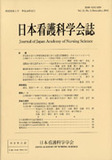Japanese
English
- 販売していません
- Abstract 文献概要
- 参考文献 Reference
- サイト内被引用 Cited by
要旨
要介護高齢者の家族の在宅介護プロセスを明らかにすることを目的に,グラウンデッド・セオリー法による質的帰納的研究を行った.
東京都内に所在する2総合病院より,要介護高齢者の在宅介護が見込まれている,あるいはすでに要介護高齢者を在宅介護中の12家族が参加家族として選ばれた.データは継続的な面接および参加観察により収集し,比較分析した.
本研究では要介護高齢者家族の在宅介護プロセスを,〈家族内ニーズの競合状態〉を中核カテゴリーとする《在宅介護のしわ寄せによる家族内ニーズの競合プロセス》として明確化した.〈家族内ニーズの競合状態〉は[しわ寄せに対する成員の苦痛],[成員間に軋轢の生じる可能性],[家族役割分担の流動性]という3属性によって特徴づけられ,程度によって〈調和の段階〉,〈仮の調和の段階〉,および〈不調和の段階〉という3段階を見いだした.さらに家族は〈仮の調和の段階〉では[しわ寄せを耐える努力],〈不調和の段階〉では[家族役割分担の組み替え]という〈競合マネジメント〉により,〈家族内ニーズの競合状態〉の増大を回避,解消して在宅介護を継続してゆくことが明らかとなった.
以上より,在宅介護のしわ寄せから家族内に生じるニーズの競合は,在宅介護する家族が直面する主要な課題であり,成員の行動や認識,および家族の役割構造の変化を説明する中心的な現象であると考えられた.また,家族はニーズの競合から一旦過酷な状況に陥っても,その状況を契機として変化し,在宅介護を継続しつつ家族成員が調和的に共生してゆける力を有すると考えられ,家族の潜在能力を開発,促進していくような援助の必要性が示唆された.
Abstract
The purpose of this research was to explore the home care process for the elderly by families using the Grounded Theory Approach. Twelve families in process of caring for or waiting for caring were picked up for this research by this approach at the two general hospitals in Tokyo. Data were collected through interviews and observations on a continuous basis, being analyzed by the comparative analysis method.
In this research, the home care process for the elderly by family was clarified by focusing on the competing needs between or among the family members arose from the “Shiwayose” (the burden shifting) of caregiving at home. The process had 3 properties of 1) distress caused by the shared burden, 2) conflict between or among family members, and 3) mobility of work sharing by family members; and included 3 stages, that is, “The stage of harmony”, “The stage of provisional harmony”, and “The disharmony”. Also it was made clear that the family members used some strategies at the stages of provisional harmony and disharmony to avoid or reduce the needs' competition and continue the home care.
The findings suggest that the needs' competition among the family members caused by the Shiwayose of the home care was the critical issue in question. Even if the family members were placed in the worst situation of confusion caused by the needs' competition, they would still have potential power to live together in harmony while continuing the home care. The health provider needs to promote such potential power, supporting the strategies that family use.
Copyright © 2002, Japan Academy of Nursing Science. All rights reserved.


